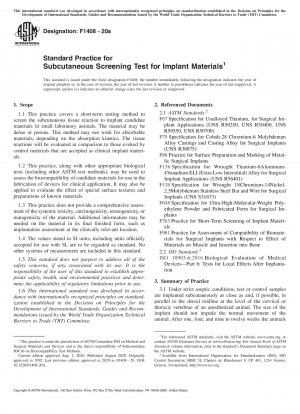ASTM F1408-20a
Standard Practice for Subcutaneous Screening Test for Implant Materials
- Standard No.
- ASTM F1408-20a
- Release Date
- 2020
- Published By
- American Society for Testing and Materials (ASTM)
- Latest
- ASTM F1408-20a
- Scope
- 1.1 This practice covers a short-term testing method to screen the subcutaneous tissue reaction to implant candidate materials in small laboratory animals. The material may be dense or porous. This method may not work for absorbable materials, depending on the absorption kinetics. The tissue reactions will be evaluated in comparison to those evoked by control materials that are accepted as clinical implant materials. 1.2 This practice, along with other appropriate biological tests (including other ASTM test methods), may be used to assess the biocompatibility of candidate materials for use in the fabrication of devices for clinical application. It may also be applied to evaluate the effect of special surface textures and preparations of known materials. 1.3 This practice does not provide a comprehensive assessment of the systemic toxicity, carcinogenicity, teratogenicity, or mutagenicity of the material. Additional information may be needed on the material in its final finished form, such as implantation assessment at the clinically relevant location. 1.4 The values stated in SI units, including units officially accepted for use with SI, are to be regarded as standard. No other systems of measurement are included in this standard. 1.5 This standard does not purport to address all of the safety concerns, if any, associated with its use. It is the responsibility of the user of this standard to establish appropriate safety, health, and environmental practices and determine the applicability of regulatory limitations prior to use. 1.6 This international standard was developed in accordance with internationally recognized principles on standardization established in the Decision on Principles for the Development of International Standards, Guides and Recommendations issued by the World Trade Organization Technical Barriers to Trade (TBT) Committee.
ASTM F1408-20a Referenced Document
- ASTM F136 Standard Specification for Wrought Titanium-6 Aluminum-4 Vanadium ELI (Extra Low Interstitial) Alloy (UNS R56401) for Surgical Implant Applications
- ASTM F138 Standard Specification for Wrought 18 Chromium-14 Nickel-2.5 Molybdenum Stainless Steel Bar and Wire for Surgical Implants (UNS S31673)
- ASTM F648 Standard Specification for Ultra-High-Molecular-Weight Polyethylene Powder and Fabricated Form for Surgical Implants*, 2021-04-01 Update
- ASTM F67 Standard Specification for Unalloyed Titanium for Surgical Implant Applications (UNS R50250, UNS R50400, UNS R50550, UNS R50700)
- ASTM F75 Standard Specification for Cobalt-28 Chromium-6 Molybdenum Alloy Castings and Casting Alloy for Surgical Implants (UNS R30075)
- ASTM F763 Standard Practice for Short-Term Screening of Implant Materials
- ASTM F86 Standard Practice for Surface Preparation and Marking of Metallic Surgical Implants*, 2021-06-01 Update
- ASTM F981 Standard Practice for Assessment of Compatibility of Biomaterials for Surgical Implants with Respect to Effect of Materials on Muscle and Bone
ASTM F1408-20a history
- 2020 ASTM F1408-20a Standard Practice for Subcutaneous Screening Test for Implant Materials
- 2020 ASTM F1408-20 Standard Practice for Subcutaneous Screening Test for Implant Materials
- 1997 ASTM F1408-97(2013) Standard Practice for Subcutaneous Screening Test for Implant Materials
- 1997 ASTM F1408-97(2008) Standard Practice for Subcutaneous Screening Test for Implant Materials
- 1997 ASTM F1408-97(2002)e1 Standard Practice for Subcutaneous Screening Test for Implant Materials
- 1997 ASTM F1408-97 Standard Practice for Subcutaneous Screening Test for Implant Materials
